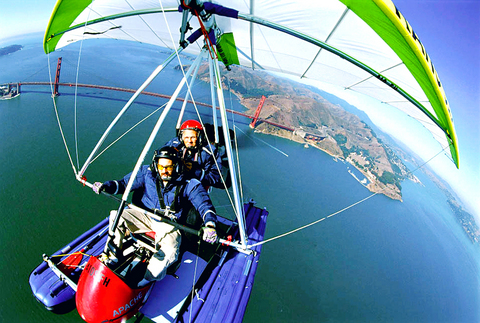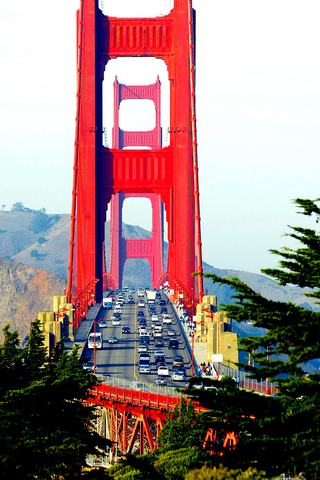San Francisco ranked first by a wide margin as the nation's number one destination for gay, lesbian, bisexual and transgender travelers, according to a survey released this week by the Travel Industry Association of America (TIA), the country's largest travel trade group.
The gay, lesbian, bisexual and transgender market has been studied before by gay-oriented organizations, but this is the first survey by a large, mainstream, nonprofit organization, said TIA spokeswoman Cathy Keefe.
According to the survey, GLBT travelers value "gay-friendly" destinations when choosing a place to take a vacation. Having a plethora of gay bars and clubs to choose from, a broad climate of acceptance, and public support for the civil rights of sexual minorities are core considerations, the online survey of 2,020 self-identified GLBT travelers showed.

PHOTOS: NY TIMES NEWS SERVICE
San Francisco ranked first as a gay-friendly destination, with 76 percent of the survey's respondents saying the city is receptive to gay visitors. Key West, Forida, was a distant second, with 57 percent calling it gay-friendly. New York City came in third with 51 percent.
"We're obviously very encouraged," said Joe D'Alessandro, president and chief executive officer of the San Francisco Convention & Visitors Bureau. "This market has the greatest growth potential," he said, referring to GLBT travelers. "The whole world is waking up to this market."
The bureau plans to partner with the gay-oriented Golden Gate Business Association on a marketing campaign for San Francisco next spring, D'Alessandro said, to meet growing competition from other destinations.

Three other California cities were included among the top 20 destinations: Los Angeles (No. 6, with 34 percent rating it as gay-friendly), Palm Springs/Palm Desert (No. 10, with 33 percent) and San Diego (No. 11, 29 percent). California destinations that didn't make the top 20 include Sonoma/Napa (14 percent) and San Jose (11 percent).
The new study also gave weight to previous studies by other organizations in characterizing gay men as a market with high disposable income. According to the travel group, "Gay men, whether traveling alone or in groups, tend to spend nearly a third more on their total trip expenses than lesbians or heterosexuals. On their most recent trip alone, gay men on average reported that they spent US$800 in total trip expenses (eg. hotels, meals, transportation, etc.). ... Heterosexuals traveling alone spent US$540 on average."
"While we've known the importance of the GLBT market for some time, this study really underscores the tremendous economic potential of the market to the travel industry," said Laura Mandala, a vice president at the travel association. "These data will be invaluable as the industry increases its efforts to reach out to this historically underserved travel segment."
The survey was conducted for the TIA by Harris Interactive and Witeck-Combs Communications, a gay-oriented marketing and public relations firm in Washington, DC. It was co-sponsored by a variety of travel trade groups and leisure-industry companies, including the Las Vegas Convention & Visitors Authority, Expedia.com, Harrah's and the American Association of Nude Recreation.

June 9 to June 15 A photo of two men riding trendy high-wheel Penny-Farthing bicycles past a Qing Dynasty gate aptly captures the essence of Taipei in 1897 — a newly colonized city on the cusp of great change. The Japanese began making significant modifications to the cityscape in 1899, tearing down Qing-era structures, widening boulevards and installing Western-style infrastructure and buildings. The photographer, Minosuke Imamura, only spent a year in Taiwan as a cartographer for the governor-general’s office, but he left behind a treasure trove of 130 images showing life at the onset of Japanese rule, spanning July 1897 to

One of the most important gripes that Taiwanese have about the Democratic Progressive Party (DPP) is that it has failed to deliver concretely on higher wages, housing prices and other bread-and-butter issues. The parallel complaint is that the DPP cares only about glamor issues, such as removing markers of Chinese Nationalist Party (KMT) colonialism by renaming them, or what the KMT codes as “de-Sinification.” Once again, as a critical election looms, the DPP is presenting evidence for that charge. The KMT was quick to jump on the recent proposal of the Ministry of the Interior (MOI) to rename roads that symbolize

On the evening of June 1, Control Yuan Secretary-General Lee Chun-yi (李俊俋) apologized and resigned in disgrace. His crime was instructing his driver to use a Control Yuan vehicle to transport his dog to a pet grooming salon. The Control Yuan is the government branch that investigates, audits and impeaches government officials for, among other things, misuse of government funds, so his misuse of a government vehicle was highly inappropriate. If this story were told to anyone living in the golden era of swaggering gangsters, flashy nouveau riche businessmen, and corrupt “black gold” politics of the 1980s and 1990s, they would have laughed.

In an interview posted online by United Daily News (UDN) on May 26, current Chinese Nationalist Party (KMT) Chairman Eric Chu (朱立倫) was asked about Taichung Mayor Lu Shiow-yen (盧秀燕) replacing him as party chair. Though not yet officially running, by the customs of Taiwan politics, Lu has been signalling she is both running for party chair and to be the party’s 2028 presidential candidate. She told an international media outlet that she was considering a run. She also gave a speech in Keelung on national priorities and foreign affairs. For details, see the May 23 edition of this column,